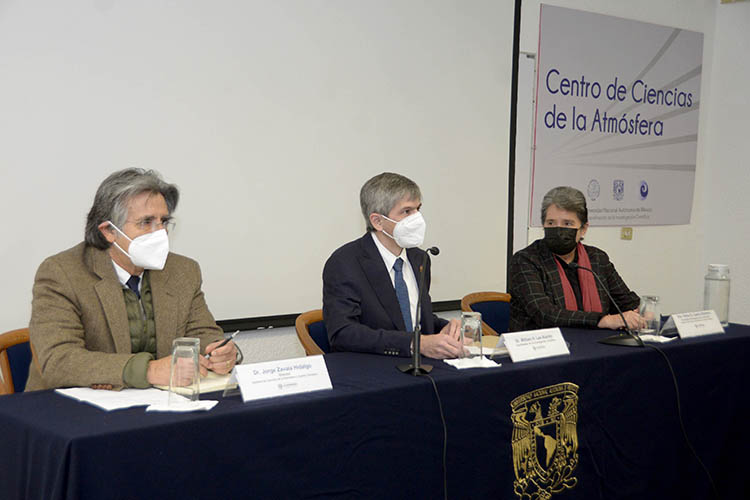This phenomenon is multifactorial and multidisciplinary, as emphasized by William Lee Allarden when he gave ownership to Jorge Zavala Hidalgo, as Director of UNAM’s ICACC.
Climate change and its surroundings are interdisciplinary, UNAM Scientific Research Coordinator William Lee Allarden emphasized when Jorge Zavala Hidalgo was appointed Director of the Institute for Atmospheric Sciences and Climate Change, for the period 2021-2025.
For this reason, he called on the community to review what could be used jointly and with other entities, within or outside the University, for the use of teams and the complementary development of lines of research with concurrent insights into entities, programs and projects. Specials.
In this context, he stressed that the issues analyzed in the ICACC are intrinsically multifactorial in nature and require a diverse and integrated approach to asking relevant questions and generating new knowledge that is translated into public policies and recommendations. who was accompanied by the university body of this academic entity.
He noted that the ICACC had not been established recently because before the researchers of the Center for Atmospheric Sciences contributed their expertise, which is why he called on the members of the Institute to strengthen activities and cooperation in preparing the development plan for the next four years. Years.
Lee Alardín said the external situation is not simple, it will require creativity to bring the topic of atmospheric science and climate change to the table, which is especially important today.
In this sense, he urged the community to work with Zavala Hidalgo to enhance the work in progress, and to identify their strengths or weaknesses.
Speaking, the new incumbent acknowledged the performance of Telma Castro Romero, former director of the CCA, whose leadership has brought about a change of center to today’s Institute for Atmospheric Sciences and Climate Change, a wish the community has had for 20 years, with Carlos Jay Garcia’s motivation.
Zavala Hidalgo expressed it: With this transformation, a new phase has begun that generates expectations and with it the challenges that we will face together, by working in harmony and involving the community in the project.
The development plan will build on the strengths of what was previously the Center for Atmospheric Sciences and will consider proposals and ideas heard in the recruitment process.
appearance
Jorge Zavala Hidalgo is a Graduated Physicist from the Faculty of Science, Ph.D. in Physical Oceanography from CICESE and has a Postdoctoral in Center for Oceanic and Atmospheric Prediction Studies He received his PhD from Florida State University, USA, where he worked as a visiting researcher for two years. He is currently a Senior Researcher C and a member of the SNI Level III.
He is known for his research on the dynamics of the ring current in the Gulf of Mexico. The circulation of the sea in the berths of the Gulf and its diversity at different time scales, and the identification of areas of convergence of currents. Groundwater outcrops in the Veracruz Reef System in summer that allow the area’s waters not to reach critical temperatures, and thus are less vulnerable to climate change.
It has developed digital forecasting systems for the National Meteorological Service, Pemex and Cenapred, and enhanced sea level monitoring networks to augment the National Tsunami Warning System and studies of the circulation and dispersal of pollutants in the Veracruz Reef System.
He formed the Ocean-Atmosphere Interaction Group of the Division of Atmospheric Sciences of the International Coordinating Committee against Corruption. led the modernization of the National Mareographic Service, making significant advances in studies of sea level changes due to climate change, tsunamis and storm surges; She collaborated on the development of the Digital Climate Atlas of Mexico, which is considered the country’s climate standard, and was editor-in-chief of the magazine Atmosphere; He was part of the UNAM Supercomputing Committee and collaborated on the development of a Bachelor’s degree project in Earth Sciences at UNAM.

“Social media evangelist. Student. Reader. Troublemaker. Typical introvert.”

:quality(85)/cloudfront-us-east-1.images.arcpublishing.com/infobae/TEQF6EONZRFGLLLDIDD4L2O4EE.jpg)

:quality(75)/cloudfront-us-east-1.images.arcpublishing.com/elcomercio/XU32LRAEZFDDPNVHLFU3CKVBYY.jpg)



More Stories
Venezuela ranks fourth in female leadership in science and technology in Latin America
In Portuguesa and Sucre they explore the wonderful world of science
The university court overturns the expulsion of two teachers and a chemical sciences student